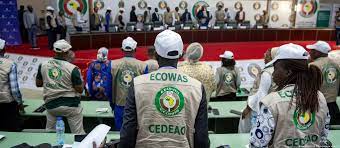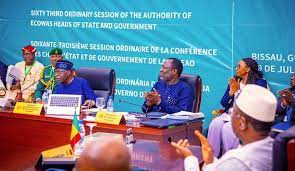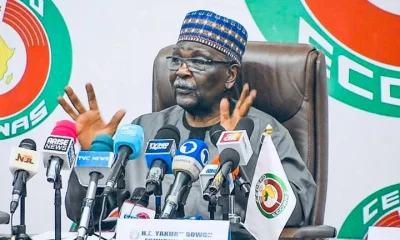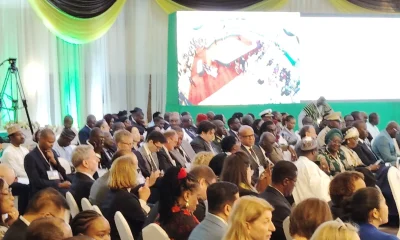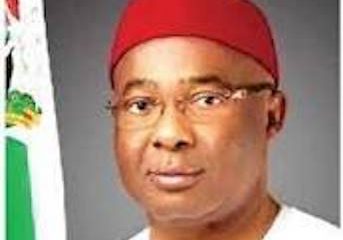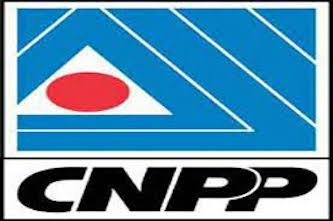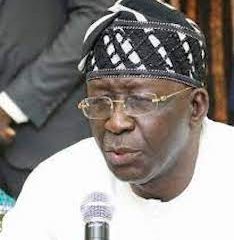BUSINESS
Nigeria’s Financial Woes Threat to ECOWAS Countries – Report

A new report by the Nigerian Economic Summit Group (NESG) and the Open Society Initiative for West Africa has disclosed that Nigeria’s financial crisis could spell doom for other West African countries.
The report also said Nigeria and 10 other Economic Community of West African States (ECOWAS) countries are currently in debt distress based on debt sustainability analysis.
The 10 other countries are Benin, Burkina Faso, Cabo Verde, the Gambia, Ghana, Guinea Bissau, Liberia, Niger, Senegal, and Togo.The report, titled ‘Debt Management, restricting and Sustainability in ECOWAS’, was recently launched at the Debt Management Office in Abuja. According to the report, a financial crisis in Nigeria can threaten other countries in the ECOWAS region.
The report read in part, “According to the debt sustainability analysis, 11 ECOWAS countries – Benin, Burkina Faso, Cabo Verde, the Gambia, Ghana, Guinea Bissau, Liberia, Niger, Nigeria, Senegal and Togo – are currently in debt distress. However, the remaining four countries – Côte d’Ivoire, Guinea, Mali and Sierra Leone – are at low risk of debt distress.
“We also find that a financial catastrophe occasioned by a debt crisis in one country may spread throughout the region. The financial woes in Nigeria, in particular, portends a serious threat to other nations in the region.”
It was further disclosed in the report that public debt accumulation in the region is unsustainable, and the need to address and avert the looming debt crisis is emphasised. “As it stands out that public debt accumulation in ECOWAS has become unsustainable, countries need to act early to avert the impending debt distress. This is important for ECOWAS countries to avoid a lost decade of getting to a debt crisis where debt settlement will be the government’s only agenda for years to come,” it added.
The report further highlighted the high debt service to revenue ratio in the region, particularly in Nigeria. The report read, “Beyond the debt figures, there are numerous indicators of debt sustainability position (Debt to GDP, External Debt to GDP, Debt Service to Revenue and a host of other ratios) in which the IMF has provided benchmarks.
However, many countries have based their debt sustainability decisions on debt indicators that give room for more borrowing. However, the debt service to revenue ratio has been a major challenge for debt management in ECOWAS – close to 100 per cent for some countries.
This is more precarious for Nigeria that recorded 97 per cent debt service to revenue in the first five months of 2021.”The report warned that the possibility of a debt crisis in Nigeria would adversely affect public and private investments, among others, further affecting the entire region.
It added, “The situation where debt service to revenue is close or over 100 per cent in some ECOWAS countries, as is in Nigeria, portends a debt cycle of borrowing to service debt and risk a potential debt crisis. The possibility of a debt crisis in some countries in the region, particularly in Nigeria, will have adverse impacts on public and private investment, foreign investment inflows, aggregate demand and the stability of the macroeconomy at large.
Following the growing economic integration among ECOWAS countries and the relevance of Nigeria in the economic structure of the region, the fallout from a debt crisis in Nigeria could have a destabilizing impact on other countries in ECOWAS”.
Nigeria’s total public debt stock increased to N39.56tn in 2021 from N32.92tn in 2020, according to the DMO. While the country borrowed about N6.64tn in 2021, it spent about N2.93tn on debt servicing payments in the same year.
Economy
Seplat Energy Pays $2bn Tax to FG in 10 Years

Seplat Energy, an independent indigenous energy company, on Tuesday, said it had paid two billion dollars tax contribution to the Federal Government of Nigeria since its listing on the Nigerian Exchange Ltd.(NGX) in 2014.
Mr Roger Brown, Chief Executive Officer(CEO), Seplat Energy, revealed this while delivering a speech at the Closing Gong ceremony in Lagos.
The event was to commemorate the company’s 10 years anniversary of dual listing on the Premium Board of the Nigerian EExchange Ltd.
(NGX) and the Main Market of the London Stock Exchange (LSE).Brown stated that the oil and gas company, Seplat, also contributed 2.8 billion dollars as tax to the federal government over the past 13 years, after its establishment in 2009.
He explained that the company paid 1.54 billion dollars as royalty to the government, 329 million dollars as Petroleum Profits Tax, 273 million dollars as Value Added Tax, and 259 million dollars as Witholding Tax.
According to him, the energy firm also paid a tax of 276 million dollars to the Nigerian Delta Development Commission (NDDC) and others as well as 126 million dollars as Pay-As-You-Earn(PAYE).
The CEO stated that at post Initial Public Offering(IPO) of the firm, it generated 1.7 billion dollars in Free Cash Flow(FCF) and invested 1.6 billion dollars in Capex.
He also said that the company had paid dividends worth 575 million dollars between 2014 when it became listed and the financial year ended 2023.
Brown noted that the business of the energy firm continued to generate strong cashflows, reflected in its strong FCF and NCFO generation.
He said: “Similarly, we have generated a cumulative 3.3 billion dollars in net operating cash flow post IPO.
“Our strong cash flow generation has supported our ambitions to expand our business, which has seen us spend an aggregate of 1.6 billion dollars in capital expenditure.
“In over 10 years, we invested 57 million dollars in community projects on health, education and empowerment as strong commitment to community development.
“As a leading supplier of gas to Nigeria’s domestic Gas-To-Power Market, at times Seplat gas powered 20 to 30 of Nigeria’s domestic grid in 2023.”
He expressed delight over the feat, reiterating Seplat Energy’s commitment to leading Nigeria’s energy transition.
According to him, the power of indigenous companies is to bring growth and prosperity to their home countries and the people.
“One example of how Seplat Energy is making an enduring difference to Nigeria and host communities where we operate is that nearly 50 million dollars had been invested by our Joint Venture partnerships in communities since our inception to date,” Brown said.
“Truly, Seplat Energy has delivered significant value by enhancing strategic, operational and financial achievements in 10 years as a listed company,” he added.
In his comments, Mr Temi Popoola, Chief Executive Officer (CEO), NGX Group, emphasised the significance of Seplat Energy’s decade of dual listing.
He said, “If we were to look back to our market and tried to find landmarks, the last major landmark you will find in the last ten years is this transaction that we are celebrating today, and the market is very grateful for that.”
Congratulating Seplat Energy on this milestone, in his welcoming remarks, Alhaji Umaru Kwairanga, NGX Group Chairman, highlighted the importance of partnerships between the NGX and companies like Seplat Energy in driving economic growth and development.
He stated that “Seplat’s journey symbolises resilience, innovation, and a commitment to excellence, making them a beacon of corporate governance and operational expertise.
“Seplat Energy has emerged as a leading indigenous energy company, deeply integrated into Nigeria’s economic landscape and the NGX Group remains committed to supporting companies like Seplat Energy as they drive economic growth and contribute to our nation’s prosperity.”
Reflecting on the significance of the decade of dual listing, Mr Udoma Udo Udoma, Board Chairman, Seplat Energy, remarked, “Seplat Energy is committed to driving Nigeria’s transition to sustainable and affordable energy, harnessing its power to improve lives by transforming the economy.
“We have ambitious goals. We are investing in Nigeria. We will support the federal government’s energy transition policy, and we will partner with FG in whatever area they want us to do.
“That is our commitment. We will grow Seplat while also maintaining the highest standard of corporate governance.”
Also commending Seplat Energy on the decade of listing, Mr Jude Chiemeka, Acting CEO, NGX, stressed the importance of the capital market in helping companies raise funds and create wealth for all.
Chiemeka said, “Seplat Energy was listed at N576 at listing and yesterday it closed at 3,370, which is an increase of over 484 per cent.
“The figures show that in the last 10 years, the company has paid out 575 million dollars in dividend payments to shareholders in Nigeria and London where they are also listed.
“So, this company has given investors a huge opportunity to really participate in wealth creation.
“Reports show that Nigeria would be among the top 20 countries in the next 25 years, and I think Seplat is poised to be one of the institutions driving growth, prosperity, and inclusion in our nation.”
Also, gracing the Closing Gong ceremony was Sen. Heineken Lokpobiri, Minister of State, Petroleum Resources (Oil), who commended the company on it laudable achievements.
“I am happy to be part of today’s celebration and Seplat’s exceptional performance in the last ten years and as Minister of State, Petroleum Resources,
“I assure you that we will partner with Seplat to expand their investments, not only for the benefit of its shareholders, but also for Nigeria.
“The least the government can do anywhere in the world is to create an environment where companies like Seplat continue to thrive.”(NAN)
Economy
34 States Shunned 35th Enugu Int’l Trade Fair
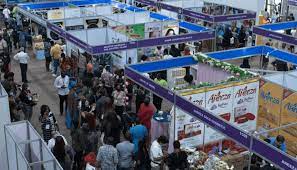
No Fewer than 34 states in the country failed to honour invitation to attend the just-concluded 35th Enugu International Trade Fair.
Reports says that only the Federal Capital Territory (FCT), Abuja; Ebonyi State and the host state, Enugu State, graced the 11-day international goods, services and idea showcasing fiesta.
The fair, which began on April 5 and ended on Monday, April 15, was themed: “Promoting made-in-Nigeria products for global competitiveness.
”Reacting, the Director-General of Enugu Chamber of Commerce, Mr Uche Mbah, said that the chamber followed due diligence in the invitation of all states to the fair.
Mbah noted that official letters were sent and official follow-up on the letters were made to ensure their presence and availability.
According to him, “we did everything to get them to add colour and increase the showcasing of products from different parts of the country and their investment viability.
“We did put in spirited efforts to see that all states participated, as most of them do previously.
“But it is unfortunate that many did not respond after receiving official letters, phone calls and interpersonal follow-ups were made.
“We got clear assurances from Kano State but they did not show up.
“We pushed harder to get Abia State but in the end, we were told that the governor did not approve,” he said.
Reports says that over 100 organisations were at the fair, which included: over 50 private companies as well as over 45 Federal and State government ministries, agencies and departments. (NAN)
BUSINESS
Fidelity Bank Posts N124.3bn Pre-tax Profit in 2023
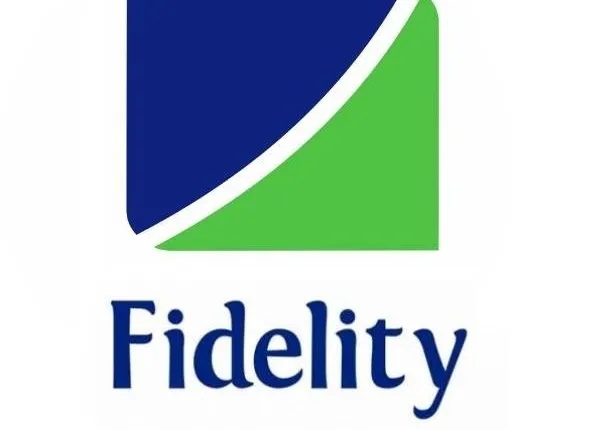
Fidelity Bank Plc has recorded a profit before tax of N124.3 billion for the year ended Dec. 31, 2023, indicating 131.5 per cent increase from N53.7 billion posted in the 2022 finacial year.
The bank disclosed this in its 2023 full year audited financial statement issued to the Nigerian Exchange Ltd.
(NGX) on Tuesday in Lagos.Fidelity Bank said it would also be paying investors a final dividend of 60k per share and total dividend of 85 kobo per share for the reporting period.
This represents a 70 per cent increase compared to the 50 kobo per share paid to its shareholders in the previous year.
The financial institution stated that this led to an increase in Return on Average Equity (RoAE) of 26.
5 per cent in the year under review, from 15.6 per cent in the corresponding year.According to the financial statement, the bank grew its gross earnings by 64.9 per cent year-on-year, to N555.83 billion.
The bank stated that this was driven by 81.6 per cent growth in net interest income which increased from N152.7 billion in year 2022 to N277.37 billion in the 2023 financial year.
This led to a profit after tax of N99.45 billion, representing a 112.9 per cent annual growth.
Commenting on the performance, Dr Nneka Onyeali-Ikpe, Managing Director, Fidelity Bank, said that the financial institution closed the financial year with strong double-digit growth across key income and balance-sheet lines.
Onyeali-Ikpe stated that the bank’s performance in 2023 was an attestation of its capacity to deliver superior returns to shareholders despite the difficulties in our operating environment.
She said: “A review of the financial performance showed that the bank grew its net interest income by 81.6 per cent to N277.4 billion.
“This was driven by a 55.5 per cent increase in interest income, thus reflecting a steady rise in asset yield throughout the year.
“The average funding cost dropped by 20bps to 4.4 per cent due to increased low-cost funds that grew from 83.6 per ent in 2022 to 97.4 per cent in 2023.
“The combination of higher asset yield and lower funding cost led to an increase in Net Interest Margin (NIM) of 8.1 per cent from 6.3 per cent in 2022 financial year.”
According to her, the total customer deposits crossed the N4 trillion mark, as deposits grew by 55.6 per cent from N2.6 trillion in 2022.
She noted that the increase was driven by 81.1 per cent growth in low-cost funds.
Onyeali-Ikpe explained that despite the challenging operating environment, the bank reaffirmed its devotion to helping individuals grow and inspiring businesses to thrive.
She said the bank also committed to empowering economies to prosper by increasing net loans and advances to N3.1 trillion from N2.1 trillion in 2022 financial year.
The managing director stated that despite the growth in its loan portfolio, regulatory ratios were maintained well above the required thresholds.
Onyeali-Ikpe noted that the bank liquidity ratio stood at 45.3 per cent in the year ended 2023, from 39.6 per cent in the year 2022, while capital adequacy ratio rose to 16.2 per cent, compared to the minimum requirement of 15.0 per cent.
“We recognise the changing dynamics in the Nigerian banking space and the need to monitor and proactively manage evolving risks.
“The proposed final dividend of 60 kobo per share reflects our commitment to strong value creation and returns to our shareholders.
“Fidelity Bank has consistently paid dividend since 2006,” she said.(NAN)

